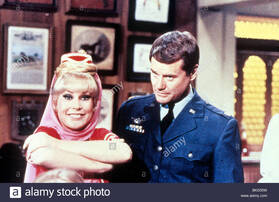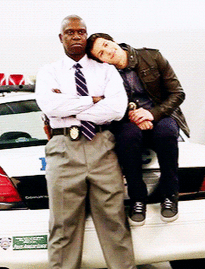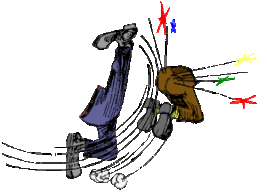Shameless Self Promotion...Rocks

“But they don’t even know I exist.” How many times, on how many shows and in how many true to life situations have you heard that tired cliché line? Thing is, it’s true. The first thing actors, writers and creatives of any kind need to do then is to let the people who can hire them, produce them, publish them and buy them a double mocha, half-caff grande at Starbucks, know they exist.
Self-promotion is a funny concept. It falls somewhere between the extremes of being egocentric and purposely invisible and a lot of times is only done in the most common and run of the mill ways. Promoting an event on Facebook, Linked-in or Twitter, asking politely for subscribers on your site or sending out countless resume’s all are good and necessary; they provide the impetus, they are the foundational agents and vital aspects of our marketing and getting produced. But they are not enough.
Reminds me the oft repeated line in “The Untouchables” movie by David Mamet, where the character Malone, played by Sean Connery would ask Elliot Ness whenever there was an obstacle to him, “what are you prepared to do?” We need to ask ourselves the very same question especially if what we are currently doing isn’t really netting us much.
Today that translates into putting yourself out there and in a different way, a scary way. What are you prepared to do that is scary to you but that if it works could bring you to a whole new level and whole new level of people? How are you networking? What are you doing that is out of the box? What creative risks are you taking on your marketing to get you in the running?
Self-doubt, in my experience, does two things: One, tells me I am not good enough, or worse not good enough yet (oh, I better wait), and two, tells me I am bothering people who I have no business bothering. But I have heard the best in our business say that they learned on the job and in the midst of the project, and as far as the second one goes, yeah, people are busy and you may bother a few, several, a lot, but sooner or later you’ll hit gold.
Overcoming self-doubt is a muscle just like your roommate’s abs, the more you put it out there the less the rejection affects you—that is the key to it as well as real support and a tribe that are with you and doing it as well. Stay connected man, that six-pack is coming.
Yeah, sure, easy for you to say, you tell us, but what are you doing that is scary Terry? Earlier this month I finished an E-book for us writers and I needed to get some juice going on it. I was interviewed and published by a brilliant blogger on writing. I also asked for and then got, an interview on VoyageLA magazine. I then contacted a ton of multi-produced TV writers and producers and asked them to read my book and give me some promotional feedback.
This was scary as I too had the self-doubt and thought they would say “no”. And do you know what? A lot of them did say no and in the most creative of Hollywood ways; “I just ain’t got the bandwidth; not right now my mask fell off; I’ll get right back to you on that as soon as I slow down…in April of 2024; I'm teaching my dog social distancing” and, of course the dozens of non replies one factors in when reaching out. Bang, pop, pow—comes with the territory. But then again, a few people did respond and help me, and this is the where the gold is. Hit the buttons below.
Also, be prepared when you do have to put up, that’s the other side of it. Do you need notes; dazzling supporting documents such as a synopitch, one-pager, written pitch document; a rewrite, a revision or the best catchphrases of the day? We got that over here at Story Builders--M here for ya there too.
So tell me, what are you prepared to do now?
Self-promotion is a funny concept. It falls somewhere between the extremes of being egocentric and purposely invisible and a lot of times is only done in the most common and run of the mill ways. Promoting an event on Facebook, Linked-in or Twitter, asking politely for subscribers on your site or sending out countless resume’s all are good and necessary; they provide the impetus, they are the foundational agents and vital aspects of our marketing and getting produced. But they are not enough.
Reminds me the oft repeated line in “The Untouchables” movie by David Mamet, where the character Malone, played by Sean Connery would ask Elliot Ness whenever there was an obstacle to him, “what are you prepared to do?” We need to ask ourselves the very same question especially if what we are currently doing isn’t really netting us much.
Today that translates into putting yourself out there and in a different way, a scary way. What are you prepared to do that is scary to you but that if it works could bring you to a whole new level and whole new level of people? How are you networking? What are you doing that is out of the box? What creative risks are you taking on your marketing to get you in the running?
Self-doubt, in my experience, does two things: One, tells me I am not good enough, or worse not good enough yet (oh, I better wait), and two, tells me I am bothering people who I have no business bothering. But I have heard the best in our business say that they learned on the job and in the midst of the project, and as far as the second one goes, yeah, people are busy and you may bother a few, several, a lot, but sooner or later you’ll hit gold.
Overcoming self-doubt is a muscle just like your roommate’s abs, the more you put it out there the less the rejection affects you—that is the key to it as well as real support and a tribe that are with you and doing it as well. Stay connected man, that six-pack is coming.
Yeah, sure, easy for you to say, you tell us, but what are you doing that is scary Terry? Earlier this month I finished an E-book for us writers and I needed to get some juice going on it. I was interviewed and published by a brilliant blogger on writing. I also asked for and then got, an interview on VoyageLA magazine. I then contacted a ton of multi-produced TV writers and producers and asked them to read my book and give me some promotional feedback.
This was scary as I too had the self-doubt and thought they would say “no”. And do you know what? A lot of them did say no and in the most creative of Hollywood ways; “I just ain’t got the bandwidth; not right now my mask fell off; I’ll get right back to you on that as soon as I slow down…in April of 2024; I'm teaching my dog social distancing” and, of course the dozens of non replies one factors in when reaching out. Bang, pop, pow—comes with the territory. But then again, a few people did respond and help me, and this is the where the gold is. Hit the buttons below.
Also, be prepared when you do have to put up, that’s the other side of it. Do you need notes; dazzling supporting documents such as a synopitch, one-pager, written pitch document; a rewrite, a revision or the best catchphrases of the day? We got that over here at Story Builders--M here for ya there too.
So tell me, what are you prepared to do now?





 RSS Feed
RSS Feed
